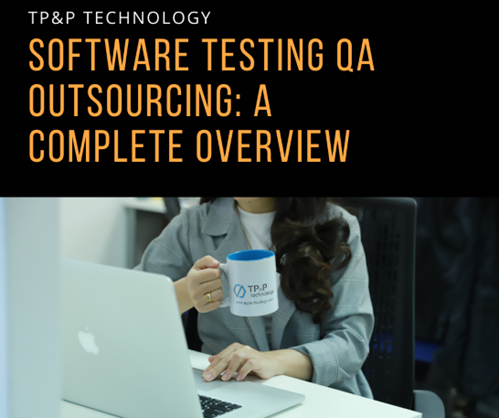
Why Businesses Should Outsource QA & Software Testing?
And, How to choose the right QA Outsourcing Vendor?
QA (Quality Assurance) Testing is critical to ensure products released to market are free from bugs and errors, providing users with a pleasant app experience as well as protect users from malicious hacking activities attempting to access their private information.
For many software development projects, QA & software testing is usually performed directly by the in-house team to make sure any error, no matter how small, is identified and fixed before they turn into larger problems which would become a lot more expensive to fix.
Yet, there are cases where in-house teams may not have the resources required for full life cycle comprehensive QA testing. As a solution, many companies have turned to outsourcing to leverage QA expertise from external software development companies to achieve an overall lower cost for QA & software testing and maintenance, and increase product quality as well as reliability.
In this article, we examine a number of factors that business organizations should pay attention to before finalizing on choosing their software testing & QA outsourcing partner.
Why Outsource QA?
Before starting to shortlist the potential vendors for your QA and software testing needs, you may need to assess internally whether QA outsourcing is indeed required for your development project, according to reasons as follow:
#1 Specialized QA expertise
Many of the times, your companies might be developing a one-off project which requires expertise in an advanced technology that your in-house QA team lacking. Since this is a one-time thing, it would make a lot more sense, in terms of economic, to outsource the project to an external agency for QA and testing, rather than hiring full-time candidates for the required technology.
Moreover, by contracting to a third party, the outsourced testing team will operate from a bias-free perspective to help detect errors and bugs more accurately, which in-house team might find it hard to do due to existing bias.
#2 Quick Project Ramp-Up
For projects that required early time-to-market which allows a very short timeframe for QA/Testing activities, especially in situations where there is also delay in development, the QA timeline is reduced as a result. And the project would demand additional QA capacity for completion meeting deadlines.
The solutions could be to either hiring extra QA staff to work on the testing activities, which could be very time consulting and may miss the deadline.
The other option is to outsource testing and QA activities to a reliable software development company which may work as an extension of your in-house team.
#3 Project Budget Constraints
One of the most common reasons which make companies outsource their QA activities is due to the lower overall costs. Hiring, training, and maintaining an in-house team is almost always expensive compared to offshore outsourcing. Thus, if your organizations are working on long-term projects with budget constraints, outsourcing QA activities could be a great way to ensure quality while still keeping the project to stay within budget at a predictable cost.
How to choose the right QA Outsourcing Company
Once it’s clear that QA is needed and suitable for your business needs, then you should start the selection process in order to hire the right QA outsourcing vendor meeting your project requirements:
1. Conduct research
Conducting research is key to select the most suitable vendor for your company’s QA needs. And even though cost is among the most important factors when it comes to choosing a QA outsourcing vendor, you should base your decision solely on cost alone.
Sometimes, the cheapest option could prove to be not cheap at all – this is because offshore QA outsourcing rates vary according to experience and expertise level. Thus, a reliable QA or software outsourcing company may charge higher rates in return for better overall quality.
So, before finalizing on the outsourcing company, you need to perform thorough research by asking about their past projects, case study, team capacity, and experience. In particular, find out about what types of testing QA services they provide, tools for test Automation (e.g. Selenium, Appium, etc.), and industry experience.
Additionally, cultural fit is also an important factor when it comes to choosing a QA outsourcing vendor. Ideally, you should try to conduct an interview with the team members from the outsourcing company to find out their English ability which is necessary for cooperation and communication with your own team. Barriers in communication might lead to misunderstanding and project delay.
Last but not least, look for the reviews and testimonials from previous clients of the potential QA outsourcing vendor (via IT business directory website such as goodfirms.co, clutch.co, etc.) for a more thorough look into the vendor’s strengths and weaknesses.
2. Technologies, tools, and infrastructure
As mentioned previously, there are certain projects that required specialized expertise which is difficult to hire talents to fill in such positions. QA testing for such projects would need appropriate tools and infrastructure in order to effectively carry out testing of certain software products. In addition, many software development project may also involve confidential and sensitive information which include customers’ payment information, therefore, an adequate infrastructure to meet security standard requirement is important.
Certain testing executions also need specialized set-up to meet testing conditions such as devices models, network conditions, so it is prudent to verify all the testing infrastructure requirements are met before the outsourcing contract is finalized.
3. Frequent Communication
Because the outsourcing team usually works in an offshore country, it’s important that you have frequent communications with them to keep track of project progress and provide feedback to stay connected with them. This can be done via video conferencing software such as Skype, Zoom, and Slack etc.
Frequent communication allows for a smooth collaboration and encourages the outsourcing team to ask for feedback and guidance when needed. Companies can then gain a deeper understanding of their projects and teams through all the feedbacks and questions, thus able to resolve any issues that potentially blocking the project progress.
4. Service Level Agreement (SLAs)
A detailed SLA provides a framework for the project requirements and timeline while also work as a guide to address any potential issues which may arise during the project cycle. Hence, a service-level agreement should be among the top considerations in order to make your QA outsourcing endeavor successful.
5. Scalability
One reason that leads the company to outsource is to quickly ramp-up testing capacity for a shorter development lifecycle. Some projects might require more QA resources than others, and as a result, you should look for a company that is capable of scaling up and down efficiently according to the requirement of the project.
Conclusion:
Not only hiring QA and testing companies can help businesses save from project budget and increase the critical time-to-market, but also ensuring their software product is free from bugs and errors, while also providing their users with a pleasant app experience protecting company brand reputation.
QA outsourcing is also an effective way for companies to have quick access to a large pool of IT talents with specialized expertise in software testing that is hard to find in the local market. QA outsourcing done well will provide companies an optimal return on investment (ROI) that is worth the time and effort spent.



